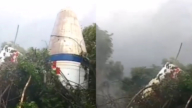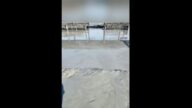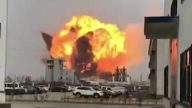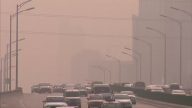【新唐人2014年04月21日讯】鉴于中国耕地资源紧缺,耕地污染尤其令人担忧。 中共官方最新数据显示,全中国有近五分之一的耕地受到污染。土地污染型态又以重金属为主,占全部污染超标土地的80%以上。
17号,中共环境保护部和国土资源部,联合发布全中国首次土壤污染状况调查公报。调查结果显示,中国土壤环境状况“不容乐观”,部分地区土壤污染较重。其中,耕地土壤环境质量堪忧,工矿业废弃地土壤环境问题凸出。
这项为期7年的调查,实际调查面积为630万平方公里。公报显示,全中国土壤总的超标率为16.1%,其中有超过1%的耕地受到重度污染。但是报告没有界定什么程度的污染是重度污染。
从土地利用类型看,耕地、林地、草地土壤超标率分别为19.4%、10.0%、10.4%。
中国问题专家,北京《国情内参》期刊首席研究员巩胜利表示,实际情况可能要比这些数据严重的多。他说,以前中共环保部曾发表数据,说中国河流的80%以上都被污染,这次公布耕地污染面积却仅为20%。
巩胜利:“我觉得这个数据有问题。因为都知道,中国的北方,还有南方开放地区,像广东、福建、浙江、上海,土地和水土(问题)相当相当厉害了。所以它现在公布的这个数据我想是处理过的。 ”
公报说,从污染类型看,以无机型(金属与重金属)为主,有机型次之,复合型污染比重较小,无机污染物超标数值占全部超标数值的82.8%。
中共环保部说,土壤环境质量受多重因素影响,中国土壤污染是经济社会发展过程中长期累积形成的。而工矿业、农业生产等人类活动和自然背景等,是造成土壤污染或超标的主要原因。
原《陕西电视台》编辑马晓明:“环境治理现在也成为政府和环境保护部门敛财的一种手段,主要就是罚款。‘反正我交了罚款了,我已经付出代价了,那我污染环境就是名正言顺的了。’当然了,你像现在政府把城市里许许多多直接冒黑烟的企业,要么你就除尘、要么把你迁走、要么你就关闭,它迁走了,它还在其它地方继续冒黑烟。”
在此之前,中共环境监管部门拒绝披露全国土壤污染数据,并把它称作一项“国家秘密”。
北京律师董正伟在过去一年多,一直向有关部门呼吁公开全国土壤污染调查数据。在当局拒绝这一请求后,董正伟受到广泛关注。
马晓明:“在很长一个历史时期,中共根本就不公布环境保护的标准,就不让中国人知道, 现在迫不得已了,有时候做一些公布,发表一些情况,但是这些情况往往继续掩饰真实的情况。而且中国现在制定的环境治理标准、环境安全标准,与国际标准还是有差距的。”
董正伟周四接受媒体采访时表示,这是让公民在环境保护问题上享有知情权的第一步。但也有专家表示,当局发布这份数据只是做个姿态,并没有提供确切的解决方案。
马晓明:“也只是口头上、主要就是口头上重视啦。真正拨了多少钱,钱是不是用在了该用的地方,是不是真正对社会的责任感,能否从全面和长远的,综合的效益上来思考问题和处理问题,是很值得打个问号的。”
巩胜利:“我觉得现在公布这个数据,只是像征性的,真正到深入的治理,最少最少都要十几年的功夫和时间来容纳。”
虽然,中共当局宣布了一系列整治土壤污染的政策和计划,其中包括正在起草中的土壤污染法,对此,中国环境专家蓝虹在接受媒体采访时曾经表示,这一草案没有对严重事故的责任方做出明确规范,这让法院难以惩处。
去年2月,中共环保部公布了《化学品环境风险防控十二五规划》,承认了“癌症村”的存在,这距离中国媒体首次报导这一问题已经过去数年。
据世界卫生组织今年2月发布的报告说,中国大陆的癌症发病率目前世界最高。
采访/朱智善 编辑/王子琦 后制/孙宁
———-
CCP Official Environmental Report States Over 20% Of Farmland Polluted
Pollution of arable land is a serious problem in China. This problem is exasperated by arable land being a limited resource. A recent survey conducted by the Chinese Communist Party (CCP), concludes that one-fifth of China’s farmland is polluted. Pollution is mainly due to heavy metals, which accounts as the source of over 80% of pollution in farmland.
On April 17, the CCP Ministry of Environmental Protection and Ministry of Land Resources, jointly announced an official report on China’s soil pollution. The report describes the situation as “not optimistic”, stating soil has been seriously polluted in some regions. The environmental quality of farmland is described as “worrisome.” Environmental problems from abandoned mining land is a particularly serious problem.
The study was carried out over 7 years, covering 6.3 million square kilometers of land in China. The report states 16.1% of the state’s land is polluted, amongst which 1% is “heavily polluted”. However, the report does not mention how it defines levels as “heavily polluted”.
The ratio of polluted arable land, woodland and grassland are 19.4%, 10.0% and 10.4% respectively.
Gong Shengli, a China expert, and Chief Researcher of Guo Qing Nei Can Journal, commented on the issue. The real situation could be much worse than what has been reported. Gong said that according to previous reports from the CCP Ministry of Environmental Protection, over 80% of China’s river systems are polluted. In comparison, this latest report only states 20% of China’s land is polluted.
Gong Shengli, Chief Researcher, Guo Qing Nei Can Journal: “I doubt this number is true. As we all know, in northern China and southern economic open areas such as Guangdong, Fujian, Zhejiang and Shanghai, land and water pollution has become very bad. So I think statistics in the CCP official report are forged ones.”
The report states that the pollutants are mostly inorganic materials, such as metals and heavy metals. Only a minority of pollutants are organic and the ratio of compound pollution is comparatively small. Inorganic pollutants contribute to 82.8% of the total.
According to the CCP Ministry of Environmental Protection, soil quality is affected by multiple factors. China’s soil pollution is an accumulated result of unchecked economic development. Human activities such as mining, agriculture, as well as expanding urban populations are major causes of pollution.
Ma Xiaoming, former editor, Shaanxi TV Station: “Environmental protection has now also become an excuse for the CCP regime to make money. It mostly does this via the use of fines. This creates the mindset of, “I’ve been fined and have paid for what I did, so it is justified for me to pollute.” In some cities, local governments now require dirty industries to either move, shut down or reduce pollution. But they move away and continue to pollute the environment elsewhere.”
Recently, CCP environmental departments still refused to release soil pollution data, claiming them as “state secrets.”
For over a year, Beijing lawyer Dong Zhengwei has been calling on the CCP authorities to announce statistics about soil pollution. His request was denied but his activities have drawn a lot of public attention.
Ma Xiaoming: “For a long period of time, the CCP has refused to release any data on environmental protection, as it does not want Chinese people knowing the truth. Now the situation is so bad that it has had to release something. However, those reports probably still serve to hide more serious problems. China’s current standards in environmental protection and safety are still falling far behind global equivalents.
In an interview on Thursday, Lawyer Dong Zhengwei told media that the official report was a first step toward the CCP sharing information with Chinese civilians on this issue. However, some experts commented that the CCP’s recent announcement is only superficial. The report does not provide any real solution to these serious problems.
Ma Xiaoming: “Everything stays within the realm of talking. How much money has been put into the right places to solve these problems? Is the regime really responsible to Chinese society? Can they undertake comprehensive thinking and take action based on long-term benefits? All these are very questionable.”
Gong Shengli: “I think that statement is only symbolic. At the very least, it takes over ten years of hard efforts to make any improvement.”
The CCP authority did announce a series of polices and plans toward improvement of soil pollution. This included a soil pollution law that is currently being drafted. However, Lan Hong, a Chinese environmental expert told media that the law makes no clear regulation for those responsible for serious environmental accidents. Therefore the court will hardly be able to punish them.
Last February, the CCP Ministry of Environmental Protection released it’s twelfth version of a ‘Five-Year Plan on Environmental Risk Control of Chemicals’. The report officially admitted the existence of “cancer villages” in China. This admission was several years following the first media reports on the issue.
The World Health Organization reported this February that China currently has the highest cancer rate in the world.




























